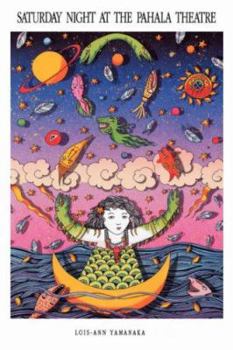Saturday Night at the Pahala Theatre
Select Format
Select Condition 
Book Overview
Poetry. Fiction. Asian American Studies. This is a work of fiction during which the characters interact in the form of poetic novellas. Born on the island of Molokai and presently living in Kahalu'u,... This description may be from another edition of this product.
Format:Paperback
Language:English
ISBN:0910043310
ISBN13:9780910043311
Release Date:January 1993
Publisher:Bamboo Ridge Press
Length:141 Pages
Weight:0.55 lbs.
Dimensions:0.4" x 5.9" x 8.9"
Customer Reviews
4 ratings
dis book is pretty solid
Published by Thriftbooks.com User , 22 years ago
dis book shows wut people in hawaii go tru and how dey talk. reading this book is like reading my life. i bet choke people in hawaii can realate to dis book. i don't find this book offensive...its just how people live. the cussing and the pidgin talk doesn't boddah me at all....i hear that kine words everyday! k-denz
Dis is da bes kine book fo all da locos in Hawai'i fo read
Published by Thriftbooks.com User , 22 years ago
dis book really wen express what da many generations in hawai'i go tru... it also wen show how da yonga generation talk to each oda and what their families had fo go tru... if you really like know what hawai'i is, rather than believe dat we stil stay living in grass huts, and wear coconut bras, read any book that Louis-Ann Yamanaka or any other hawaii writer wrote for the true flavor of our islands.
Close As You'll Get to the "Real" Hawaii in Fiction
Published by Thriftbooks.com User , 24 years ago
Like the author, I grew up Japanese-American in 1970s Hawaii, largely in the world that Yamanaka portrays in her stunning literary debut, "Saturday Night at the Pahala Theatre." When I first read this book, I felt shocked, offended, scandalized, and totally unprepared to deal with a book that mirrored so closely the world that I knew. That's because I, like everyone else I grew up with, never saw ourselves in literature before. Quite simply, "Pahala Theatre" was the very first of its kind, and powerfully raw, emotional, and effective at that. It pulls no punches, and perhaps captures more pain than pleasure, but believe me, the pain she captures is "authentic" (I know, I know, "authentic" is a questionable descriptive term to use when judging fiction). Still, like none before it, this book provides a cathartic experience for those of us who, up until now, have never seen ourselves expressed as literary characters. (And no, Michener certainly doesn't do it-- not the interiority that we feel is our own, anyway. How could he?). Yamanaka's book focuses on adolescence in a particular time and place, and growing up Japanese-American in post WWII Hawaii meant that one was part of the population majority, and also not necessarily marginalized politically or economically. But you were still an outsider beyond Hawaii's shores, and mainstream American culture, transmitted via the media, made you aware of this daily. So there was a uniquely paradoxical "majority-but-minority" identity dynamic going on, which you should keep in mind while reading the book. Yamanaka's celebrated use of "pidgin," Hawaii's creole dialect, holds a mirror up to nature, as 'twere. You won't find it more "authentic" than in "Pahala Theatre"-- she does a spectularly natural job of it-- and it's gratifying that professional literary reviewers from the mainland have hailed her use of it as an "exciting new poetic language" (I always thought that pidgin has its profoundly expressive moments--even if many of these reviewers benignly misunderstand much of it). Take it or leave it, but know this: Yamanaka's is a literary world that is more deeply and exquisitely rendered than the "hula-girl-grass-skirt-aloha-shirt," commodified vision of Hawaii used for a century to lure tourists to the islands. Nothing necessarily wrong with that, mind you, but still, Yamanaka deftly captures the subtle sights, sounds, smells, thoughts, and feelings of growing up "Local" in Hawaii in the '70s. If you want an unparallelled literary expression of that particular culture-- small, totally unique, fragile, painful, and beautiful as it is --then buy this book!
Shocking poetry with a cruel beauty
Published by Thriftbooks.com User , 24 years ago
This is not a book for light reading. This isn't even a book for medium reading. These are seriously heavy poems that must be studied carefully. At first they may seem crude, making Yamanaka appear a twisted author, but she is only being brutally honest. A person would have to do some research, or have some kind of understanding of why she wrote these stories. Don't just take them at face value. They're deeper than your first impression leads you to believe. I've read the poems in this book some 2, some 3 and 4 times, I'm still pretty sure I don't get all of it. But what I do understand is amazing, harsh, and in its way beautiful. To hear her read them brings the characters and the stories to life.




